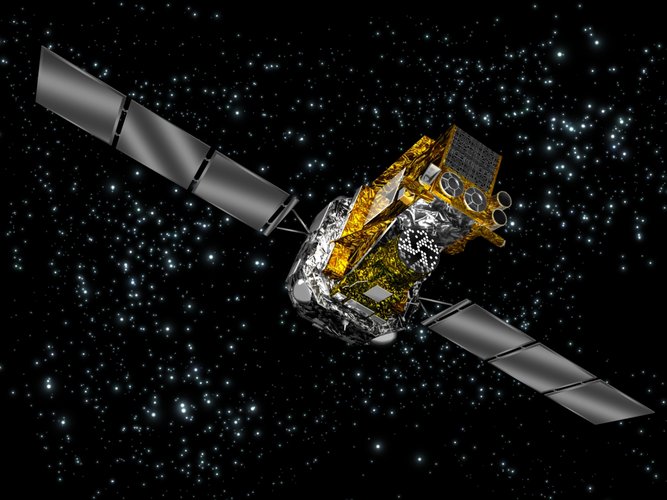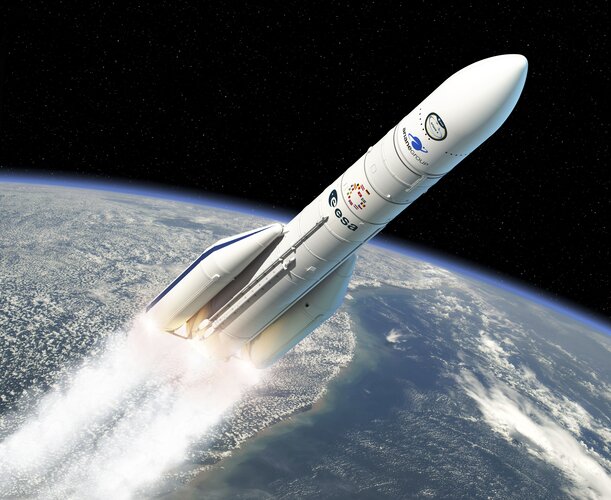
Copernical Team
Mission accomplished for Integral, ESA’s gamma-ray telescope

Earth from Space: Maha Kumbh Mela festival, India
 Image:
The Copernicus Sentinel-2 mission captured the Maha Kumbh Mela festival, the world’s largest human gathering, which took place in the city of Prayagraj in northern India.
Image:
The Copernicus Sentinel-2 mission captured the Maha Kumbh Mela festival, the world’s largest human gathering, which took place in the city of Prayagraj in northern India. Week in images: 24-28 February 2025

Week in images: 24-28 February 2025
Discover our week through the lens
Shenzhou 19 Crew Advances Scientific Research and Conducts Training in Space
 Astronauts aboard China's Tiangong space station have been actively engaged in scientific research and technical tasks, as confirmed by the China Manned Space Agency (CMSA).
A video released by the CMSA on Sunday showcased astronauts Cai Xuzhe, Song Lingdong, and Wang Haoze conducting operations inside the space station's core module, Tianhe. Having been in space for nearly four months, th
Astronauts aboard China's Tiangong space station have been actively engaged in scientific research and technical tasks, as confirmed by the China Manned Space Agency (CMSA).
A video released by the CMSA on Sunday showcased astronauts Cai Xuzhe, Song Lingdong, and Wang Haoze conducting operations inside the space station's core module, Tianhe. Having been in space for nearly four months, th UAH team determine local dark matter density using direct acceleration measurements
 Dr. Sukanya Chakrabarti, the Pei-Ling Chan Endowed Chair in the College of Science at The University of Alabama in Huntsville (UAH), and her team have pioneered the use of gravitational acceleration measurements of binary pulsars to help illuminate just how much dark matter there is in the Milky Way galaxy and where it resides.
Their previous study promised that as the number of data point
Dr. Sukanya Chakrabarti, the Pei-Ling Chan Endowed Chair in the College of Science at The University of Alabama in Huntsville (UAH), and her team have pioneered the use of gravitational acceleration measurements of binary pulsars to help illuminate just how much dark matter there is in the Milky Way galaxy and where it resides.
Their previous study promised that as the number of data point NASA's EZIE Launching to Study Magnetic Fingerprints of Earth's Aurora
 High above Earth's poles, intense electrical currents called electrojets flow through the upper atmosphere when auroras glow in the sky. These auroral electrojets push about a million amps of electrical charge around the poles every second. They can create some of the largest magnetic disturbances on the ground, and rapid changes in the currents can lead to effects such as power outages.
High above Earth's poles, intense electrical currents called electrojets flow through the upper atmosphere when auroras glow in the sky. These auroral electrojets push about a million amps of electrical charge around the poles every second. They can create some of the largest magnetic disturbances on the ground, and rapid changes in the currents can lead to effects such as power outages. The Galactic Voyage of Our Solar System
 An international team of researchers, led by the University of Vienna, has determined that our Solar System journeyed through the Orion star-forming complex, a key structure within the Radcliffe Wave, around 14 million years ago. This passage through a dense region of interstellar space may have compressed the heliosphere, the protective bubble surrounding the Solar System, and increased the inf
An international team of researchers, led by the University of Vienna, has determined that our Solar System journeyed through the Orion star-forming complex, a key structure within the Radcliffe Wave, around 14 million years ago. This passage through a dense region of interstellar space may have compressed the heliosphere, the protective bubble surrounding the Solar System, and increased the inf BlackSky Secures Major Defense Innovation Unit Contract for Gen-3 Tactical GEOINT Expansion
 BlackSky Technology Inc. (NYSE: BKSY) has secured a multimillion-dollar contract from the Defense Innovation Unit (DIU) to oversee the launch integration of a Gen-3 Tactical GEOINT (TACGEO) satellite. This award builds on earlier U.S. government-funded research and development efforts aimed at advancing space-based tactical intelligence, surveillance, and reconnaissance (ISR) capabilities. Under
BlackSky Technology Inc. (NYSE: BKSY) has secured a multimillion-dollar contract from the Defense Innovation Unit (DIU) to oversee the launch integration of a Gen-3 Tactical GEOINT (TACGEO) satellite. This award builds on earlier U.S. government-funded research and development efforts aimed at advancing space-based tactical intelligence, surveillance, and reconnaissance (ISR) capabilities. Under Mission accomplished for Integral, ESA's gamma-ray telescope
 The European Space Agency's gamma-ray telescope ends its observations next 28th February. During its 22 years in space, Integral has reshaped our view of the most dramatic events in the Universe. The high-energy observatory played a pivotal role in revealing the nature of the cosmic explosions known as gamma-ray bursts and in uncovering the origin of gravitational wave events. Recently, it deliv
The European Space Agency's gamma-ray telescope ends its observations next 28th February. During its 22 years in space, Integral has reshaped our view of the most dramatic events in the Universe. The high-energy observatory played a pivotal role in revealing the nature of the cosmic explosions known as gamma-ray bursts and in uncovering the origin of gravitational wave events. Recently, it deliv 




































